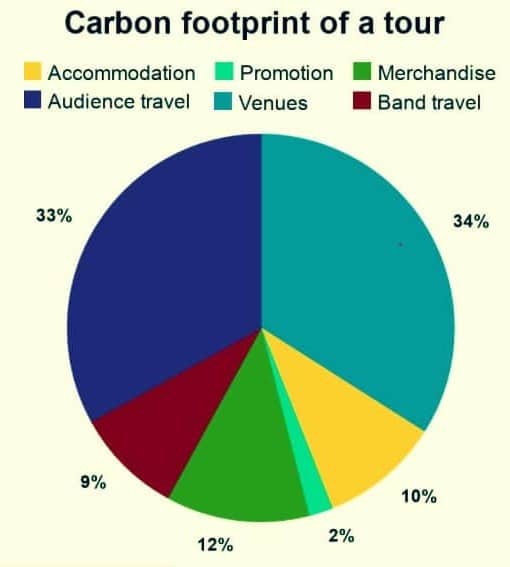Concerts produce waste and carbon emissions and are generally not good for the planet. Musicians have fought back by going carbon neutral or net zero to balance the scales.
Artists are lowering their carbon footprints and buying carbon credits to make up the unavoidable emissions for as much as $200 per ton.
From Coldplay to Pearl Jam and John Jackson and Billie Eilish, artists are working together with nonprofits to help lower their carbon footprint and make concert tours carbon-neutral.
Carbon Footprint of a Concert Tour
Millions of fans flock to concerts and festivals during summers when the weather is great to enjoy live music. But experts say that these shows can also harm the earth.
That’s because both artists and concertgoers travel, either by land or by air which emits a lot of CO2. Also, promoting albums and performing live around the world means musicians and their entourage fly a lot.
Then there are the emissions from tour buses, from moving sets, and from making concert merchandise. Not to mention the energy needed to power the venue, for things like sound and lighting.
A study of the five artists’ tour via an online carbon-tracking tool revealed that they released over 19 metric tons of CO2 during music festivals.
- Meanwhile, recent estimates suggest that a live concert emits 405,000 tonnes of GHG emissions in the UK each year.
Here’s the breakdown of concert tours’ carbon footprint.
A report released in 2021 by the United Kingdom-based Tyndall Centre for Climate Change Research said music industry stakeholders can help significantly slash tour-related emissions by monitoring transportation and energy use.
One of the report’s authors noted that:
“It’s important for artists to consider sustainability options in show design, tour routes and transportation from the early stages of creating a tour — rather than bringing someone in to ‘green’ what you already planned.”
How Musicians are Making a Difference
Fighting climate change is happening across various sectors and it’s no different for top musicians, who are criticized for the carbon footprint of their world concert tours.
But a growing wave of musicians are stepping up and making climate pledges to achieve carbon neutral shows.
Some artists are opting for rail travel versus airplanes, stage designers are going for LED displays versus conventional lighting.
Moreover, promoters urge fans to carpool or take public transit to venues. Some music festivals have even tried bundling up entrance tickets with public transit fares.
- More remarkably, singers and bands are now working with nonprofit organizations and venues where they perform to ensure their shows reduce the music industry’s footprint.
Musicians seek guidance from experts who can organize sustainability initiatives to make their events eco-friendly.
An example is REVERB, a non-profit organization that acts as greening techs for live concert shows.
The group ensures sustainability measures are in place during the event. For instance, they work with venues to secure reusable products used by concertgoers.
The organization works with tours to empower fans, too. At each show they handle, the group sets up “eco-villages” where fans interact with their volunteers to know how they can make a positive impact.
And that includes using the free water refill stations and reducing single-use plastic bottles. These measures lower both plastic waste and carbon emissions.
To date, the organization has eliminated over 4 million single-use bottles at concert tours. They were also able to reduce emissions amounting to 300,000 tons of CO2. That’s equivalent to avoiding the footprint of 3 million pounds of burned coal.
That achievement involves the high ranks of musicians and bands making climate pledges.
Reducing and Offsetting Footprint
Jack Johnson has been aiming for a carbon-neutral show through a reusable pint-cup program and water refilling stations in his concerts. He’s also into carbon offsetting where $2 from each concert ticket goes toward offset projects.
Another pop culture icon Billie Eilish is also taking the same climate action to cut her tour’s carbon footprint. Besides cutting plastic waste and emissions, her tour venues feature plant-based food options with a lower carbon footprint.
For bands, efforts are even grander.
Coldplay, for instance, leverages an app technology that logs fans’ mode of transportation to their concerts. Those who opt for carpooling, using an electric car or taking public transit get a discount on the band’s merchandise.
Then after shows, the band assesses the logged data from fans and plans to offset their footprint. For example, they plant a tree for each ticket bought by a fan.
Perhaps nothing can beat what Pearl Jam has been doing to tackle its carbon emissions.
The legendary grunge band began offsetting its world tours’ emissions in 2003, and since then, they made investments of over $1 million dollars in carbon credits to offset emissions from touring.
- In fact, Pearl Jam committed to buy carbon credits for $200 per ton for its Gigaton tour. Globally, the price for carbon offset varies, ranging from $1-15 per ton.
Projects supported by carbon credits run the gamut from sustainable fuels to rainforest protection to renewable energy sources.
By doing all they can to reduce their tours’ carbon footprint, musicians hope to influence their fans even long after their concert ends. That is to continue investing their effort and money in carbon-reducing events.
Even the concert companies Live Nation and Big Concerts, both have sustainability goals. The whole music industry seems to be onboard a net zero path.
In December 2021, three major record labels (Warner, Sony, and Universal) and several independents signed the Music Climate Pact. Their pact aims to reduce greenhouse gas emissions to net zero by 2050, and to achieve a 50 per cent reduction by 2030.


